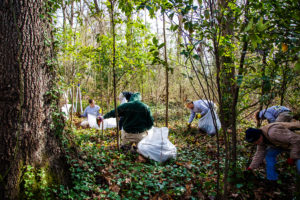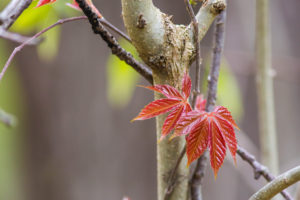AmeriCorps team attacks invasive species

This week is National Invasive Species Awareness Week, so it’s a perfect time for Overton Park Conservancy to host a visiting AmeriCorps crew to tackle some of the aggressive invasive plant species in the Old Forest.
For the past few weeks, an eight-person team from the AmeriCorps National Civilian Community Corps (NCCC) has been in Memphis performing ecological restoration work at Overton Park and at the Meeman Biological Station, adjacent to Meeman-Shelby Forest State Park. At both sites, they’re focused on restoring forest ecosystems by removing invasive plant species like English ivy vines and shrubs like mahonia, nandina, privet, and bush honeysuckle. These species are native to other regions of the world and were brought over to the United States as ornamental landscape plants. The seeds were then spread into ecosystems like the Old Forest by wind, water, and animals, bringing them to an environment where they have few natural predators.
Without manual intervention like that of the AmeriCorps crew and Overton Park Conservancy staff and volunteers, these plants will continue to spread, crowding out the more than 200 native plant species that birds, pollinating insects, and other creatures in the forest need to survive.

English ivy has been a particular focus of the Conservancy’s invasive control efforts this winter. This vine, which climbs the sides of homes and other buildings, is particularly difficult to eradicate. It can re-root in soil if just a small piece of the plant touches the ground, which means that a bit of vine from a home garden could wash away and easily establish in another location. If you’re a home gardener looking for another groundcover or shade-tolerant plant, the Virginia Native Plant Society offers this list of alternatives that would thrive in our region and provide benefits to wildlife.
The AmeriCorps crew will complete their service in Memphis next week and move along to another area in the Southeast. As spring arrives and wildflowers begin to pop up in the Old Forest, the Conservancy will pause our invasive control efforts until June to avoid trampling the delicate native plants. Spring will also allow the invasive plants to use up their stored winter energy to leaf out, making them weaker and more susceptible to control once summer arrives.
We’re eager to see what springs up in the places where the AmeriCorps crew has removed English ivy. Although combating these plants will be a never-ending process, the chance to make major progress in just a few short weeks has been incredibly valuable, and we are grateful to have worked with this wonderful team to restore the health of the forest.



